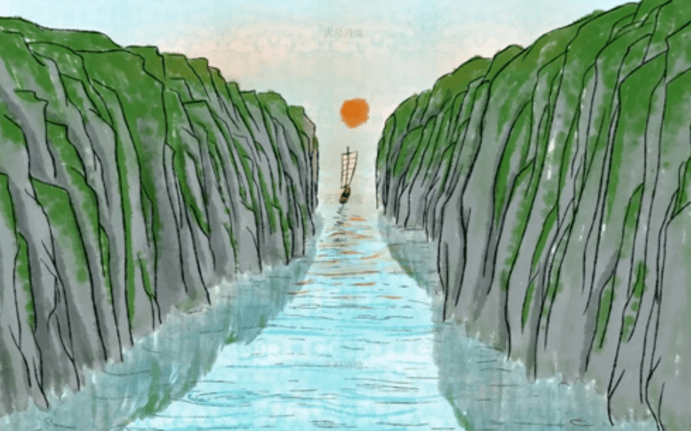Hi, dear readers, it is time to share the ancient Chinese poem again. Today I want to introduce you a famous poem titled "Viewing the Tianmen Mountains/望天门山” from the Immortal Poet Libai/李白.
It is said that the author wrote it when he was a 25-year-old young man who left his family and hometown in Si Chuan province at the first time. During his journey, he was inspired by the magnificent and splendid nature of Tianmen Mountain and Chu River different from his hometown. He couldn't help singing high praise of the beautiful landscape and expressing his joyful emotions. The whole poem exudes a youthful and optimistic atmosphere. At the same time, legend has it that Libai died by drowning in the same Chu River while he was drunken on a boat, trying to chase after the moon in the water. Although there are a few different versions of his death, I would rather to believe he died of grasping the moon, which just matches up with his romantic spirit.
Without any further ado, let's enjoy the poem together.

望天门山
(李白)
天门中断楚江开,(kai)
碧水东流至此回。
两岸青山相对出,
孤帆一片日边来。(lai)
In this poem, the first sentence and the last one rhyme with 'ai'. And there is the perfect antithesis, too, such as 两岸/both banks matches 孤帆/lonely boat; 出/go matches 来/come, etc.
As before, here I just offer 2 versions of its English translation, so you can compare them by yourself and judge which one you like more.
Viewing the Tianmen Mountains
(Its translator is unknown. )
The split in the Tianmen Mountains allows the Chu River to flow.
The blue waters running east turns to eddies here.
Green cliffs on both sides gradually unfold themselves.
Afar a solitary sail is coming from where the sun sheds its light.
Below is some geographic information about this poem for reference:
The Tianmen Mountains is the overall name for both East Liangshan(东梁山) and West Liangshan(西梁山). They are situated to the southwest of the county seat of Dangtu(当涂) in Anhui Province, one on each side of the Yangtze River. What's more, historical records clearly show that Libai died and was buried in Dangtu county.
Chu River is that part of the Yangtze River which runs through what was formerly called the land of Chu(楚) of the Warring States Period. Yangtze River is the longest river of China originated from Tibet Plateau, pouring into the East China sea by Shanghai.
The second version is the same from the famous translator Xu Yuanchong whose English version is well-known for the rhyming.
Mount Heaven's Gate Viewed from Afar
Breaking Mount Heaven's Gate, the great River rolls through,
Its east-flowing green billows, hurled back here, turn north.
From the two river banks thrust out the mountains blue,
Leaving the sun behind, a lonely sail comes forth.
Oh, the green water, the blue mountains, the red sun and the white sail... What a gorgeous picture!
I hope you relish this classical ancient Chinese poem which is one of my favorites and learn something new about China.
Very good! Beautiful poem. Another translation I've read is:
by Larry Elder and his wife, Ning Qinzhong
Please keep them coming. I enjoy your shares.
I'm so happy to know you enjoy this poem. Thank you for your encouragement so much! It is my biggest motivation to keep on sharing. Yeah, the version you offered is great, too, especially the last sentence: A slice of sun on the horizen is more vivid and exact. (Although I've never heard of Larry Elder and his wife, I guess he should be an American scholar. )
However, for my part, the first version is more true to the original. It seems that the mountains on both sides are unfolding themselves to greet the poet's ship like the red carpet rolling out. 出/go out matches 来/come in. The second version wins in its rhyming.
This poem has some wonderful images. I think I prefer the second version, but they're both great.
Thank you for your enjoying this poem! I love both, too. Yeah, the images are very wonderful.
The surging Chu River/Yangtze River seems to split the Mountain Tianmen in half when running from the west to east in Dangtu county. Then it turns north and arrives in Nanjing, pouring into East China sea by Shanghai in the end. (It is also very interesting for myself to learn something new when I read this poem again.) The mountains on both sides gradually unfold themselves as if to greet the ship by which the young poet Li Bai began his journey.
(Oh, maybe I should add one point: Tianmen is the pinyin/phonics of 天门. 天 means sky or heaven; 门 means gate. So in the second version, the translator calls it as Mountain Heaven's Gate.)
Thank you for the added explanation. I enjoy how these poems are rooted in the authors' history and the landscape around them. I know that translations are difficult and one loses some meaning in the process. These poems were probably meant to be read aloud, so there's the added complexity of sound and pronunciation.
You are right. These ancient Chinese poems are apt for reading aloud. Most of quatrains were written in rhyming and antithesis. I always feel it is absolutely a good way for foreigners to learn Chinese by starting with them.
True, it is interesting to enjoy how the poems are rooted in the authors's history, thus we can transcend time and space gladly.